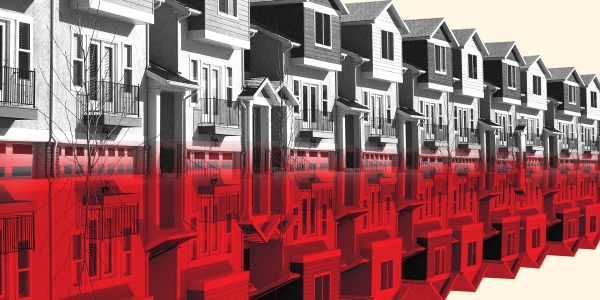
Builders and real estate agents alike are celebrating signs of life in the U.S. housing market. That’ll happen when a mild home price correction coupled with mortgage rates falling from 7.37% in early November to 5.99% in February improves affordability a bit just as the market enters its busy season.
But those builders and agents might want to avoid getting too excited: Already, mortgage rates are back on the rise.
On Friday, the average 30-year fixed mortgage rate swung back up to 6.8%. Over the past few weeks, rates have steadily climbed as financial markets, which have seen stronger than expected economic and inflationary data, are pricing in higher odds of the Fed holding interest rates higher for longer.
That 6.8% mortgage rate is the highest reading measured by Mortgage News Daily since early November. It also means that affordability is once again deteriorating.
A borrower who took on a $500,000 mortgage in early February 2023 at a 5.99% fixed rate would have gotten a monthly principal and interest payment of $2,995. At a 6.8% rate (i.e. the average rate on Friday), a borrower would get a $3,260 monthly payment on the same size loan.
At first glance, there’s nothing historically abnormal about a 6.8% mortgage rate. However, that understates its impact. See, it’s less about the numerical mortgage rate and more about the total monthly mortgage payment as a percentage of new borrowers’ incomes. And when accounting for everything (i.e. house prices, incomes, and mortgage rates), the Federal Reserve Bank of Atlanta says, housing affordability is as bad now as it was right before the housing bubble burst in 2007.
The chart below—which shows year-over-year change in mortgage rates—illustrates how housing affordability deteriorated so fast over the past year.
As long as housing affordability remains pressurized like this, many housing economists and analysts believe it’ll be hard to sustain a strong recovery in home sales.
Heading forward, economists say there are three levers that can improve housing affordability: rising incomes, falling home prices, and falling mortgage rates.
Of those three levers, mortgage rates can make the biggest impact in the short-term. We saw just that as falling mortgage rates between early November and early February translated into slightly improved activity levels. The opposite could occur in March and April if mortgage rates keep pushing towards 7%.
Where are mortgage rates heading from here? To get some clues, Fortune once again tracked down mortgage rate forecasts from eight leading research firms (Fortune did a similar roundup for 2023 home price forecasts). Keep in mind that during an inflationary run it’s challenging to predict future mortgage rates.
The Mortgage Bankers Association: The D.C.-based trade group projects that the 30-year fixed mortgage rate will average 5.2% in 2023. Beyond this year, the group expects mortgage rates to average 4.4% in both 2024 and 2025.
Bank of America: Researchers at the investment bank expect mortgage rates to fall to 5.25% by the end of 2023. “Mortgage rates likely peaked in 2022 and the historically wide 30-year mortgage rates and 10-year treasury yield spread between could narrow through 2023. Our structured products team expects the 30-year mortgage rate to decline to roughly 5.25% in 2023, as spreads normalize with lower treasury volatility,” wrote BofA researchers on Jan. 11.
Morgan Stanley: The Agency MBS strategists at Morgan Stanley believe that mortgage rates will fall to 6% by the end of 2023. (Here’s the investment bank’s home price outlook.)
Fannie Mae: Economists at Fannie Mae, which was chartered by U.S. Congress in 1938 to provide affordable mortgage financing, project that the 30-year fixed mortgage rate will average 6.3% in 2023 and 5.7% in 2024.
Freddie Mac: Economists at Freddie Mac, which like Fannie Mae was also chartered to provide affordable mortgage financing, forecast that the 30-year fixed mortgage rate will average 6.4% in 2023.
Moody’s Analytics: The financial intelligence arm of Moody’s projects that the 30-year fixed mortgage rate will average 6.5% through most of 2023. (You can find Moody’s Analytics regional and national home price outlook here.)
Goldman Sachs: The investment bank projects that the 30-year fixed mortgage rate will end 2023 at 6.5%. “We expect 30-year fixed mortgage rates to rise to 6.5% by year-end, reflecting narrower mortgage spreads due to a rebounding MBS market—particularly for securitizations with explicit or implicit government guarantees—but higher Treasury yields. We also note that the rapid decline in mortgage origination, especially refinances, has caused some lenders to exit or scale back lending. This has the potential to allow the remaining lenders to expand their margins by pushing mortgage rates higher,” wrote Goldman Sachs researchers on Jan. 23. (You can find Goldman Sachs’ latest home price forecast here).
Realtor.com: Economists at the home listing site believe the 30-year fixed mortgage rate will average 7.4% in 2023.


Want to stay updated on the housing market correction? Follow me on Twitter at @NewsLambert.
